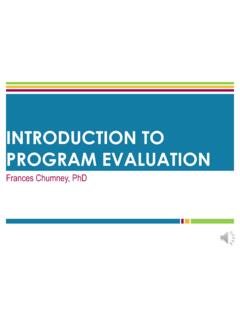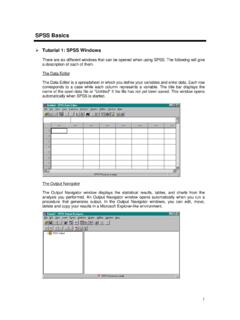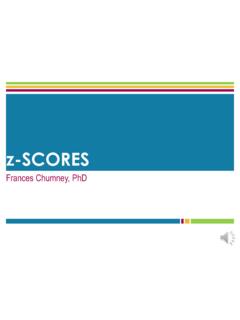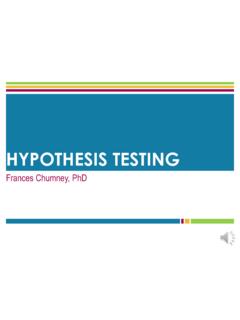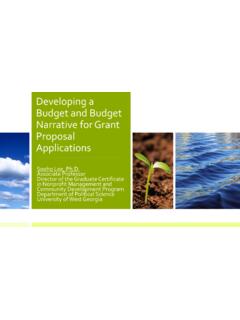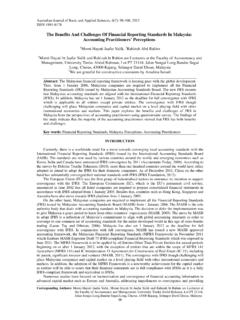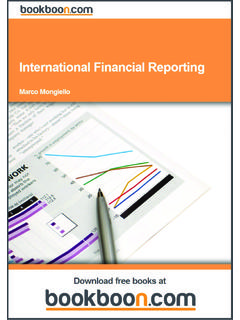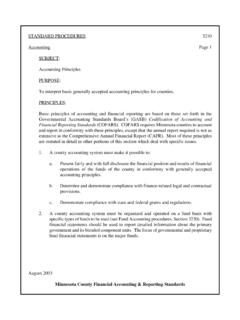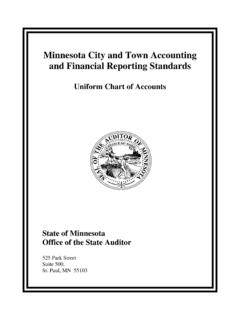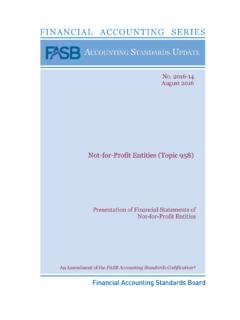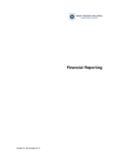Transcription of Financial Reporting Standards: Global Or International?
1 Financial Reporting standards : Global Or international ? By Frederick Lindahl and Hannu Schadewitz Peer Reviewed Frederick Lindahl is an Associate Professor of Accountancy, The George Washington University. Hannu Schadewitz is a Professor of Accounting, Turku School of Economics, University of Turku, Finland. Acknowledgements The authors would like to thank Huihong Tan, Yinka Dare, Jianing Liu, Rami Katajisto, and Atte A. Salminen for their able research assistance. This research has benefited from funding by the OP Bank Group Research Foundation and the Turku School of Economics.
2 Abstract Purpose This paper studies quantitative, monetary information about differences between IFRS and US GAAP in the three principal Financial statements. 2. Design/methods/approach Comparative data from the same company are compared. The explanations of differences are found in lengthy end notes. The sample is from civil law countries with reputations for high integrity, which reduces the possible confounding effects of legal systems or earnings management. Sample countries are highly economically developed, thereby reducing distortions that would result from different fair value conditions.
3 Findings A few key standards account for most of the monetary differences between the accounting standards . In some cases large differences in one direction offset large differences in the other direction, reducing the insights obtainable from only comparing income. Research limitations/implications The window of data availability for single company Reporting under both standards was narrow. However, because of convergence activities, these differences are likely slowly to decline. Originality/value This is the only paper to examine the footnote disclosure in sufficient detail to accurately measure differences.
4 It is also the only paper to analyze the cash flow statement. It is valuable for Financial analysts and academic researchers who study accounting quality and make international comparisons. I. INTRODUCTION. The world of corporate governance was radically changed when the European Union, Australia, and New Zealand adopted IFRS applicable to Financial reports from 2005. EU adoption created a massive economic bloc that used a common language to report Financial results. For the first time, those countries spoke the same language , and reports from their companies were comparable with each other and with many other IFRS countries throughout the world.
5 It is largely agreed that IFRS is a set of high quality accounting standards replacing local standards of varying quality. Thus, these countries joined the US in using uniformly high quality accounting. An important question is, Are these two sets of high quality standards comparable with each other? While IFRS had some of its origins in US standards , it is not clear how similar are final IFRS to US. standards . 3. This paper addresses that question. If US and IFRS standards are similar, it can be said that standards are Global ; and that Financial Reporting is comparable around the world.
6 The comparability of Reporting would be increased if the US were to adopt IFRS. The US Securities and Exchange Commission is studying whether to adopt IFRS as the US. standard (SEC 2012). The likelihood of this depends on the similarity of the two sets of standards . Motivated by these two crucial questions the Global character of accounting standards and the likelihood of future uniformity--this study offers evidence on the quantitative differences at the time of IFRS. adoption based on information available around the time of the change.
7 Convergence increasing similarity of accounting standards is an expressed goal ( Norwalk Agreement in 2002). However, progress has been slow since the choice of accounting standards involves legal, economic, political, and cultural factors. This paper addresses the core issue: do IFRS and US GAAP provide similar accounting figures for the same firm? We analyze this issue from the perspectives of (1) investors, (2) Financial analysts, and (3) academic researchers who investigate the quality of Financial Reporting .
8 We show the degree of similarity in these data, which are the raw material for these three groups of users. Since the needs for these three constituencies are not the same, we treat them separately. We know from many sources ( , KPMG, 2014; Baudot, 2014). that the standards say different things. We know much less about whether in practice these differences occur often and when they do occur, if they lead to material differences in monetary amounts. Our contribution is to measure, rather than verbally describe, differences between IFRS and US.
9 GAAP. There is vigorous debate among academics (Albrecht, 2008; Dye and Sunder, 2001; Sunder, 2009), practitioners (Selling 2008), standard setters, and regulators (Niemeier, 2008) about the relative strengths of US. GAAP and IFRS. For example, some argue that IFRS is the stronger set because it is principles-based (Tweedie, 2007). Others argue that US. GAAP is equally principles-based (Kershaw, 2005) or that GAAP is better because it has more bright line rules that limit earnings management (Bratton and Cunningham 2009).
10 Furthermore, accounting 4. research shows that IFRS is better than GAAP ( , Ashbaugh and Olsson, 2002), and that GAAP is better than IFRS ( , Bradshaw and Miller 2008). Much of the disagreement comes from the imprecision of better. Some base their view on smaller analyst forecast errors, some on value relevance , and some on accounting quality metrics (Dechow et al., 2010). Perhaps this debate has not reached consensus because the participants in the debates have too little data, as mainly they have verbal descriptions of differences.


